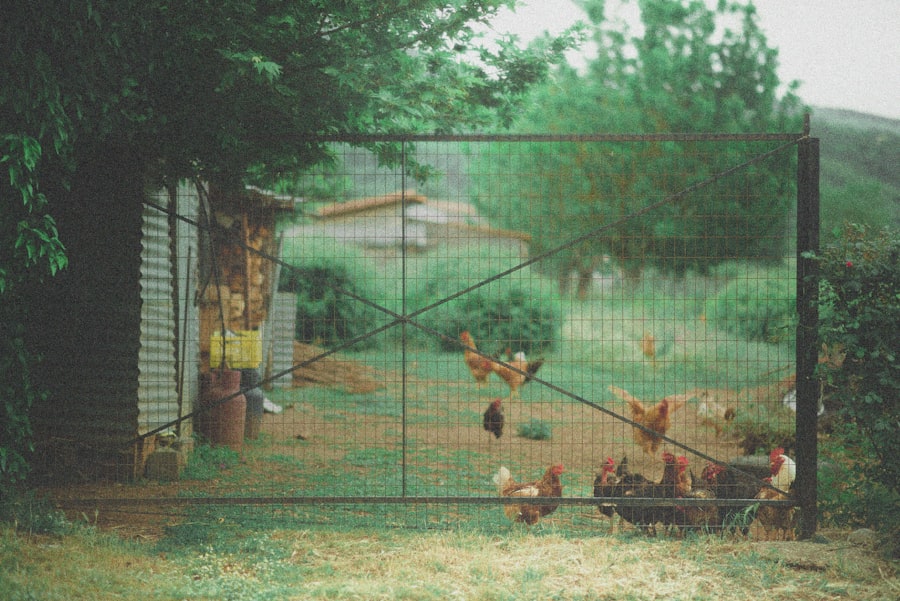Buffalo gnats, also known as black flies or turkey gnats, are small flying insects belonging to the Simuliidae family. These insects are commonly found near bodies of water such as rivers, streams, and lakes, as they require running water for egg-laying. Buffalo gnats are most active during warmer months, typically from late spring to early fall.
They are notorious for their painful bites, which cause irritation and discomfort to humans and animals alike. These insects are attracted to carbon dioxide, warmth, and moisture, making them a common nuisance during outdoor activities and for livestock. Buffalo gnats exhibit swarming behavior, often gathering in large numbers near their breeding sites.
They are primarily active during daylight hours, with peak activity in the early morning and late afternoon. Female buffalo gnats require blood meals for reproduction, which makes them a significant threat to animals, including baby chickens. These pests can cause stress and discomfort to young birds, potentially leading to reduced growth and productivity.
Understanding the behavior and life cycle of buffalo gnats is essential for implementing effective control measures to protect baby chickens from their harmful effects.
Table of Contents
- 1 Risks of Buffalo Gnats to Baby Chickens
- 2 Preventing Buffalo Gnats from Infesting the Chicken Coop
- 3 Natural Remedies for Keeping Buffalo Gnats Away from Baby Chickens
- 4 Commercial Products for Buffalo Gnat Control
- 5 Monitoring and Managing Buffalo Gnat Infestations
- 6 Seeking Veterinary Advice for Buffalo Gnat Control
- 7 FAQs
Key Takeaways
- Buffalo gnats, also known as black flies, are small biting insects that can cause irritation and discomfort to baby chickens.
- Baby chickens are at risk of developing anemia and even death from buffalo gnat bites due to their small size and vulnerability.
- Prevent buffalo gnats from infesting the chicken coop by keeping the area clean and dry, and using screens and netting to keep them out.
- Natural remedies such as planting insect-repelling herbs and using essential oils can help keep buffalo gnats away from baby chickens.
- Commercial products such as insecticides and repellents can be used to control buffalo gnat infestations, but should be used with caution around baby chickens.
- Regular monitoring of the chicken coop and surrounding areas for buffalo gnat activity is important, and seeking veterinary advice can help in managing infestations effectively.
Risks of Buffalo Gnats to Baby Chickens
Impact on Behavior and Health
The constant irritation from buffalo gnat bites can also disrupt the normal behavior of baby chickens, affecting their feeding and growth. Additionally, the presence of buffalo gnats can lead to increased stress levels in baby chickens, making them more susceptible to other health issues and diseases.
Disease Transmission Risks
Furthermore, buffalo gnats can transmit various pathogens and parasites to baby chickens through their bites, posing a significant risk to their overall health and well-being.
Importance of Control Measures
The potential for disease transmission from buffalo gnats highlights the importance of implementing effective control measures to protect baby chickens from these pests. It is essential for poultry owners to be aware of the risks associated with buffalo gnats and take proactive steps to prevent infestations in the chicken coop.
Preventing Buffalo Gnats from Infesting the Chicken Coop

Preventing buffalo gnats from infesting the chicken coop is crucial for protecting baby chickens from the harmful effects of these pests. One of the most effective ways to prevent buffalo gnat infestations is to eliminate their breeding sites near the chicken coop. Since buffalo gnats require running water to lay their eggs, it is important to remove any standing water or stagnant areas near the coop.
This can be achieved by proper drainage and regular maintenance of water sources such as troughs, ponds, and puddles. Another preventive measure is to install fine mesh screens on windows and vents to prevent buffalo gnats from entering the chicken coop. This can help create a barrier against these tiny pests while allowing for proper ventilation inside the coop.
Additionally, keeping the chicken coop clean and free of organic debris can help reduce the attractiveness of the area to buffalo gnats. Regular removal of manure, spilled feed, and other organic matter can minimize the presence of breeding sites and potential food sources for these pests.
Natural Remedies for Keeping Buffalo Gnats Away from Baby Chickens
There are several natural remedies that can be used to keep buffalo gnats away from baby chickens. One effective method is to plant insect-repelling herbs and flowers around the chicken coop. Plants such as lavender, mint, basil, and marigold are known for their insect-repelling properties and can help deter buffalo gnats from the area.
Additionally, hanging bundles of dried herbs inside the coop can provide a natural barrier against these pests. Another natural remedy is the use of essential oils with insect-repelling properties. Essential oils such as citronella, eucalyptus, and lemongrass can be diluted with water and sprayed around the chicken coop to repel buffalo gnats.
These natural repellents can help create a protective barrier against these pests while minimizing the use of chemical-based products. Furthermore, introducing natural predators of buffalo gnats, such as dragonflies and damselflies, can help control their population around the chicken coop.
Commercial Products for Buffalo Gnat Control
In addition to natural remedies, there are several commercial products available for controlling buffalo gnats in and around the chicken coop. Insect repellent sprays specifically designed for poultry can be used to protect baby chickens from buffalo gnats. These sprays are formulated to repel a wide range of flying insects, including buffalo gnats, while being safe for use around poultry.
It is important to follow the manufacturer’s instructions when using insect repellent sprays to ensure the safety of baby chickens. Another commercial product for buffalo gnat control is insecticide-treated netting or fabric covers that can be used to create a protective barrier around the chicken coop. These covers are designed to prevent buffalo gnats from entering the coop while allowing for proper airflow.
Additionally, insecticide-treated strips or tapes can be installed around windows and vents to repel buffalo gnats from entering the coop. When using commercial products for buffalo gnat control, it is essential to choose options that are safe for use around poultry and follow all safety guidelines provided by the manufacturer.
Monitoring and Managing Buffalo Gnat Infestations

Early Detection is Key
Regular inspections of the chicken coop and surrounding areas can help identify early signs of buffalo gnat activity. Monitoring for adult buffalo gnats, larvae, and breeding sites near the coop provides valuable information for implementing targeted control measures.
Environmental Factors to Consider
It is essential to keep track of environmental conditions that are conducive to buffalo gnat infestations, such as warm weather and proximity to water sources. These factors can contribute to the proliferation of buffalo gnats and exacerbate infestations.
Effective Management Strategies
Once buffalo gnat infestations are identified, it is vital to implement effective management strategies to control their population. This may involve using a combination of natural remedies and commercial products to repel and eliminate buffalo gnats from the chicken coop. Additionally, maintaining good hygiene practices in the coop, such as regular cleaning and waste removal, can help minimize the attractiveness of the area to these pests. By monitoring and managing buffalo gnat infestations proactively, poultry owners can protect baby chickens from the risks posed by these tiny pests.
Seeking Veterinary Advice for Buffalo Gnat Control
In cases where buffalo gnat infestations pose a significant risk to baby chickens, it is important to seek veterinary advice for effective control measures. Veterinarians specializing in poultry health can provide valuable guidance on managing buffalo gnat infestations and protecting baby chickens from their harmful effects. They can recommend specific products and treatment options that are safe and effective for use around poultry.
Veterinary advice is particularly important when dealing with severe buffalo gnat infestations that pose a threat to the health and well-being of baby chickens. Veterinarians can conduct thorough assessments of the chicken coop environment and provide tailored recommendations for controlling buffalo gnats. Additionally, they can offer guidance on monitoring baby chickens for signs of stress or illness caused by buffalo gnat bites and provide appropriate treatment if needed.
In conclusion, understanding the behavior and risks of buffalo gnats is crucial for protecting baby chickens from their harmful effects. By implementing preventive measures, using natural remedies and commercial products, monitoring infestations, and seeking veterinary advice when needed, poultry owners can effectively control buffalo gnats in and around the chicken coop. Protecting baby chickens from buffalo gnats requires proactive management and a comprehensive approach to minimize the risks posed by these tiny pests.
If you’re looking for ways to keep buffalo gnats off baby chickens, you may also be interested in learning about how many eggs geese lay. Check out this article to find out more about geese breeding and egg production.
FAQs
What are buffalo gnats?
Buffalo gnats, also known as black flies, are small biting insects that are commonly found near bodies of water. They are known for their painful bites and can be a nuisance to both humans and animals.
Why are buffalo gnats a problem for baby chickens?
Buffalo gnats can pose a threat to baby chickens as their bites can cause irritation, discomfort, and even lead to health issues such as anemia. Additionally, the constant biting can cause stress and affect the overall well-being of the baby chickens.
How can I keep buffalo gnats off baby chickens?
There are several methods to keep buffalo gnats off baby chickens, including using protective netting or mesh around the chicken coop, applying insect repellent specifically designed for poultry, and providing a well-ventilated and dry environment to reduce the presence of buffalo gnats.
Are there any natural remedies to keep buffalo gnats off baby chickens?
Some natural remedies to keep buffalo gnats off baby chickens include using essential oils such as citronella, lavender, or eucalyptus, as well as planting insect-repelling herbs such as basil, mint, and rosemary around the chicken coop. Additionally, providing a dust bath with diatomaceous earth can help deter buffalo gnats.
What are the signs that baby chickens are being affected by buffalo gnats?
Signs that baby chickens are being affected by buffalo gnats include restlessness, excessive scratching or pecking at their skin, decreased appetite, and visible signs of irritation such as redness or swelling around the bite areas. It’s important to monitor the baby chickens closely and take action if any of these signs are observed.
Meet Walter, the feathered-friend fanatic of Florida! Nestled in the sunshine state, Walter struts through life with his feathered companions, clucking his way to happiness. With a coop that’s fancier than a five-star hotel, he’s the Don Juan of the chicken world. When he’s not teaching his hens to do the cha-cha, you’ll find him in a heated debate with his prized rooster, Sir Clucks-a-Lot. Walter’s poultry passion is no yolk; he’s the sunny-side-up guy you never knew you needed in your flock of friends!







